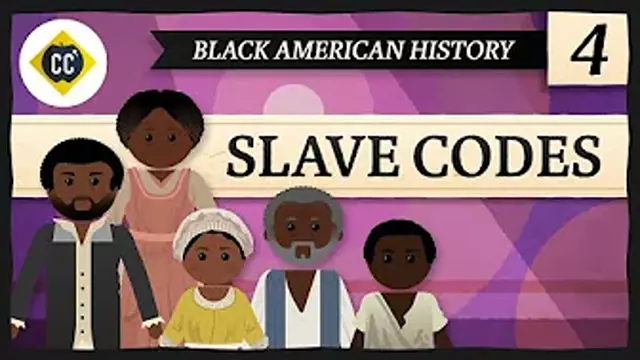2021-05-29
[public] 391K views, 45.7K likes, 469 dislikes audio only
Slave codes were a method of protecting the investment of white enslavers in the Colonies by restricting the lives of enslaved people in almost every imaginable way. The codes restricted enslaved people’s ability to move around, or engage in commerce that could make them financially independent - they restricted the opportunities that would allow them to live with even relative freedom. Today, we'll learn how Colonies put laws in place to restrict the movement and freedoms of enslaved people and free Black people.
VIDEO SOURCES
Ira Berlin, Many Thousands Gone: The First Two Centuries of Slavery in North America (Cambridge: Harvard University Press, 1998).
John Hope Franklin, From Slavery to Freedom: A History of Negro Americans (New York: Knopf, 1967).
Claude M. Steele, Whistling Vivaldi: How Stereotypes Affect Us and What We Can Do (Reprint Edition ed. 2011).
Black Codes and Slave Codes, Colonial, , Oxford African American Studies Center , http://oxfordaasc.com/view/10.1093/acref/9780195301731.001.0001/acref-9780195301731-e-44570.
Peter H. Wood, Black Majority: Negroes in Colonial South Carolina from 1670 through the Stono Rebellion (New York: W.W. Norton, 1974).
Jennifer L. Morgan, Partus sequitur ventrem: Law, Race, and Reproduction in Colonial Slavery, 22 Small Axe: A Caribbean Journal of Criticism 1–17 (2018).
Watch our videos and review your learning with the Crash Course App!
Download here for Apple Devices: https://apple.co/3d4eyZo
Download here for Android Devices: https://bit.ly/2SrDulJ
Crash Course is on Patreon! You can support us directly by signing up at http://www.patreon.com/crashcourse
Check out Clint's book: https://bookshop.org/books/how-the-word-is-passed-a-reckoning-with-the-history-of-slavery-across-america/9780316492935
Thanks to the following patrons for their generous monthly contributions that help keep Crash Course free for everyone forever:
Alexis B, Rene Duedam, Burt Humburg, Aziz, Nick, DAVID MORTON HUDSON, Perry Joyce, Scott Harrison, Mark & Susan Billian, Junrong Eric Zhu, Alan Bridgeman, Jennifer Smith, Matt Curls, Tim Kwist, Jonathan Zbikowski, Jennifer Killen, Sarah & Nathan Catchings, Brandon Westmoreland, team dorsey, Trevin Beattie, Eric Koslow, Indika Siriwardena, Khaled El Shalakany, Shawn Arnold, Siobhán, Ken Penttinen, Nathan Taylor, William McGraw, Laura Damon, Andrei Krishkevich, Sam Ferguson, Eric Prestemon, Jirat, Brian Thomas Gossett, Wai Jack Sin, Ian Dundore, Jason A Saslow, Justin, Jessica Wode, Mark, Caleb Weeks
__
VIDEO SOURCES
-Ira Berlin, Many Thousands Gone: The First Two Centuries of Slavery in North America (Cambridge: Harvard University Press, 1998).
-John Hope Franklin, From Slavery to Freedom: A History of Negro Americans (New York: Knopf, 1967).
-Claude M. Steele, Whistling Vivaldi: How Stereotypes Affect Us and What We Can Do (Reprint Edition ed. 2011).
-Black Codes and Slave Codes, Colonial, , Oxford African American Studies Center , http://oxfordaasc.com/view/10.1093/acref/9780195301731.001.0001/acref-9780195301731-e-44570.
-Peter H. Wood, Black Majority: Negroes in Colonial South Carolina from 1670 through the Stono Rebellion (New York: W.W. Norton, 1974).
-Jennifer L. Morgan, Partus sequitur ventrem: Law, Race, and Reproduction in Colonial Slavery, 22 Small Axe: A Caribbean Journal of Criticism 1–17 (2018).
Want to find Crash Course elsewhere on the internet?
Facebook - http://www.facebook.com/YouTubeCrashCourse
Twitter - http://www.twitter.com/TheCrashCourse
Tumblr - http://thecrashcourse.tumblr.com
Support Crash Course on Patreon: http://patreon.com/crashcourse
CC Kids: http://www.youtube.com/crashcoursekids
#crashcourse #history #slavery
/youtube/video/gu9RIGGXeNo?t=0
/youtube/video/gu9RIGGXeNo?t=82
/youtube/video/gu9RIGGXeNo?t=171
/youtube/video/gu9RIGGXeNo?t=247
/youtube/video/gu9RIGGXeNo?t=293
/youtube/video/gu9RIGGXeNo?t=397
/youtube/channel/UCX6b17PVsYBQ0ip5gyeme-Q
youtube.com/channel/UCwTZ-JLF5FQ3EmQ2nPaS-lg
https://www.patreon.com/crashcourse
/youtube/video/xPx5aRuWCtc

